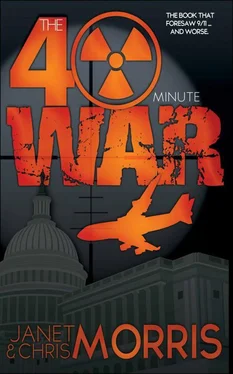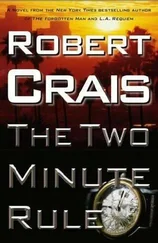Slick forced open the building’s steel door with Ashmead’s help while Thoreau shut down the chopper and booby-trapped it with a radio-detonating device as well as a tamper-trigger.
When they’d slid the heavy door aside, Beck stepped in and shone his halogen lamp around: the emergency route in and out of Langley seemed untouched by the blast. But that was what its architects had intended.
Even the emergency generator functioned when Slick found its circuit breaker and tripped it, flooding the tunnel, its tracks and electric car, with red light.
Nye fed his Langley access card into a slot in the wall and the car whirred. Beyond it, a three-inch-thick steel door drew back to reveal the beginnings of the more than two miles of tunnel hewn from solid rock.
There wasn’t a rockfall on the track for as far as they could see; the disaster-bracing above had held while hell broke loose on the surface.
And yet, somewhere, there was a breach: Beck’s digital Geiger counter ran out of digits and he tapped Ashmead to bring it to the Covert Action Chief’s attention. For some reason, he was hesitant to speak, as if he were in a tomb.
Ashmead didn’t say anything either, just shrugged.
They all piled into the electric cart, Nye and Beck in the middle with the team around them, shielding them with their bodies from whatever they might encounter, Thoreau facing behind, Ashmead driving, Slick standing with legs spread and weapon at the ready, though everyone else in the car was seated.
Somehow, though Beck was sure no one could have broken in here and survived for long, the tactical caution of the team around him made Beck feel better.
Twenty minutes later, because the car crawled at a snail’s pace and once in a while they did find a rock on the tracks which had to be moved, they drew to a halt before the door to Langley’s sub-basement, where Nye had to perform a more complicated entrance procedure: hand and voice print as well as card ID.
Beck saw him shiver as he took off his glove to press the plate and wince once he’d done it: hot is hot, and Langley was hot as hell. Like stigmata, red weals appeared on Nye’s palm.
Beck saw them as he gloved it once more and touched his friend, who slumped against him, then recovered: “All in my mind, no doubt,” Nye joked lamely as the door slid back and, leaving the cart, they stepped inside.
Above their heads was the executive garage and tons of collapsed building: Thoreau had given them a description of a photo-reconnaissance shot he’d seen to explain why he didn’t want to bother with a flyby.
Beck couldn’t have cared less about what existed or no longer existed above ground.
Down here, where 159 had flourished and then died of budget problems and lack of tangible, usable results, the condition of things mattered terribly.
Every time Beck saw crumbled concrete fallen from the ceiling it was as if someone jabbed him with a hot poker. When a passageway they needed to enter was blocked by a buckled steel door that would not be moved, Beck began to swear in Greek, the foulest of his store of epithets, until Nye told him, “Relax, we’ll just go in the other way.”
The two additional years Nye had spent down here had seen many changes. Without his first-hand knowledge, they’d never have made it to the proper corridor.
But eventually they did and, though everyone’s breathing was raspy, Nye laughed like a delighted child: “Looks good as new.”
It wasn’t, behind the black door that demanded lock-plate and voice identification, but it was close enough.
They fired up the emergency power source and they all held their breath.
When the red lights came on and the dust covers came off the equipment, Slick said: “Looks like we’re rolling,” and stretched out in an ergonomic chair, his feet up on a communicator’s Telex that wouldn’t be telling anyone anything because there was no one upstairs to tell and soon there wouldn’t be enough power left in the entire building to draw any of the steel doors back, let alone send out a message.
Looking around in the red light, with perspiration rolling down his skin so that it crawled, Beck said: “Okay, gentlemen. Time for the good news/bad news. The good news is that whatever we can do, we’ve got the power to do. The bad news is that once we do it, we’re trapped in here.”
“That ain’t news to me, Casper,” Slick said.
“Well, Nye and I think that there’s no reason you can’t leave now if you want to: you too, Ashmead. Take your team and get out.”
“We can’t get past the voice ID. And you’ll need all the power you can coax out of these things,” said Ashmead, his face glistening with sweat in his helmet. “Don’t get all humanitarian on us, kid. We’re here to see that you do your job.”
With a flick, Ashmead’s submachine gun was trained on him. A glance out of the corner of his eye showed Beck that Thoreau had Nye similarly covered.
Slick yawned and stretched: “Not that we thought you’d punk out, but you never know how somebody’s going to act under pressure.”
“We’re here to help,” Thoreau put in, “and for the duration. So why don’t you two brains get started?”
Suddenly, Beck remembered Slick telling him that if not for Thoreau, Slick would have killed him on the plane after Beck’s intransigence had led to the deaths of Jesse and Yael.
And yet he didn’t feel betrayed, or even nervous: there were all kinds of courage, and there were moments ahead in which he might well lose his nerve.
It was nice to know that Rafic and his boys were there to make sure that the job got done.
“Well, Sam, come on then, don’t let them intimidate you.” Beck bared his teeth and leveled his best stare at Nye, who was standing very still and breathing shallowly. “Time to get to work.”
It took an hour and a half to make sure everything was ready and all systems go. Intermittently Beck thought about Chris Patrick, his wife and kids, and the casualties from Ashmead’s team. But it didn’t hurt his concentration—it may have helped it.
Finally Beck said, “Well, Sam, I think that’s got it.”
“Me, too,” said Nye, “and just in time. I don’t know about you, but I’ve about had it. Go ahead, Marc—push the button.”
Beck, too, was feeling queasy from the heat, queasy enough that when the lights flickered, he wasn’t sure if they really had or if it was eyestrain. Surges wouldn’t bother this system, which had a backup emergency supply, but when it went down, it would be down for good.
“Ashmead?” Beck asked. “Thoreau? Slick?”
Only Ashmead answered: “Give it your best shot, Beck.”
Slick had his head on his arm, slumped over a nonoperational console and Thoreau, on the floor with his back against the wall and the M-10 balanced on his updrawn knees, didn’t open his eyes.
Beck tapped the “run” button on the mainframe computer before him and saw his reflection staring back at him. He gave it a thumbs-up.
Then the lights went out.
Book Three:
COVERT ACTION
The Saudi fondness for preformed concrete had made Riyadh a study in architectural culture clash exceeded nowhere in the Middle East.
Through the window of his high-rise Riyadh Marriott Hotel room, Ashmead watched the Cadillacs, gleaming in the evening streetlights, cruise by and waited for the phone to ring.
The connecting door to Slick’s room was open and Ashmead’s deputy, in a show of optimism, had finished laying out their operations gear and was changing into his black fireproof jumpsuit which was padded with neoprene at the elbows, shoulders and knees and tailored to fit without binding over his lightweight kevlar body armor.
Читать дальше












